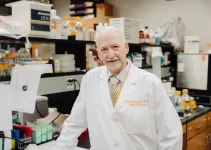(Press-News.org) Cambridge scientists have shown that the hypothalamus, a key region of the brain involved in controlling appetite, is different in the brains of people who are overweight and people with obesity when compared to people who are a healthy weight.
The researchers say their findings add further evidence to the relevance of brain structure to weight and food consumption.
Current estimations suggest that over 1.9 billion people worldwide are either overweight or obese. In the UK, according to the Office for Health Improvement & Disparities, almost two-thirds of adults are overweight or living with obesity. This increases an individual’s risk of developing a number of health problems, including type 2 diabetes, heart disease and stroke, cancer and poorer mental health.
A large number of factors influence how much we eat and the types of food we eat, including our genetics, hormone regulation, and the environment in which we live. What happens in our brains to tell us that we are hungry or full is not entirely clear, though studies have shown that the hypothalamus, a small region of the brain about the size of an almond, plays an important role.
Dr Stephanie Brown from the Department of Psychiatry and Lucy Cavendish College, University of Cambridge, said: “Although we know the hypothalamus is important for determining how much we eat, we actually have very little direct information about this brain region in living humans. That’s because it is very small and hard to make out on traditional MRI brain scans.”
The majority of evidence for the role of the hypothalamus in appetite regulation comes from animal studies. These show that there are complex interacting pathways within the hypothalamus, with different cell populations acting together to tell us when we are hungry or full.
To get around this, Dr Brown and colleagues used an algorithm developed using machine learning to analyse MRI brain scans taken from 1,351 young adults across a range of BMI scores, looking for differences in the hypothalamus when comparing individuals who are underweight, healthy weight, overweight and living with obesity.
In a study published today in Neuroimage: Clinical, the team found that the overall volume of the hypothalamus was significantly larger in the overweight and obese groups of young adults. In fact, the team found a significant relationship between volume of the hypothalamus and body-mass index (BMI).
These volume differences were most apparent in those sub-regions of the hypothalamus that control appetite through the release of hormones to balance hunger and fullness.
While the precise significance of the finding is unclear – including whether the structural changes are a cause or a consequence of the changes in body weight – one possibility is that the change relates to inflammation. Previous animal studies have shown that a high fat diet can cause inflammation of the hypothalamus, which in turn prompts insulin resistance and obesity. In mice, just three days of a fat-rich diet is enough to cause this inflammation. Other studies have shown that this inflammation can raise the threshold at which animals are full – in other words, they have to eat more food than usual to feel full.
Dr Brown, the study’s first author, added: “If what we see in mice is the case in people, then eating a high-fat diet could trigger inflammation of our appetite control centre. Over time, this would change our ability to tell when we’ve eaten enough and to how our body processes blood sugar, leading us to put on weight.”
Inflammation may explain why the hypothalamus is larger in these individuals, the team say. One suggestion is that the body reacts to inflammation by increasing the size of the brain’s specialist immune cells, known as glia.
Professor Paul Fletcher, the study’s senior author, from the Department of Psychiatry and Clare College, Cambridge, said: “The last two decades have given us important insights about appetite control and how it may be altered in obesity. Metabolic researchers at Cambridge have played a leading role in this.
“Our hope is that by taking this new approach to analysing brain scans in large datasets, we can further extend this work into humans, ultimately relating these subtle structural brain findings to changes in appetite and eating and generating a more comprehensive understanding of obesity.”
The team say more research is needed to confirm whether increased volume in the hypothalamus is a result of being overweight or whether people with larger hypothalami are predisposed to eat more in the first place. It is also possible that these two factors interact with each other causing a feedback loop.
The research was supported by the Bernard Wolfe Health Neuroscience Fund, Wellcome and the NIHR Cambridge Biomedical Research Centre, with additional funding from Alzheimer’s Research UK.
Reference
Brown, SSG, et al. Hypothalamic volume is associated with body mass index. Neuroimage: Clinical; 8 Aug 2023; DOI: 10.1016/j.nicl.2023.103478
END
Brain’s ‘appetite control centre’ different in people who are overweight or living with obesity
2023-08-08
ELSE PRESS RELEASES FROM THIS DATE:
Mineralization of bone matrix regulates tumor cell growth
2023-08-07
ITHACA, N.Y. -- Tumor cells are known to be fickle sleeper agents, often lying dormant in distant tissues for years before reactivating and forming metastasis. Numerous factors have been studied to understand why the activation occurs, from cells and molecules to other components in the so-called tissue microenvironment.
Now, an interdisciplinary Cornell team has identified a new mechanism regulating tumor growth in the skeleton, the primary site of breast cancer metastasis: mineralization of the bone matrix, a fibrous mesh of organic and inorganic components that determines the unique biochemical and biomechanical properties of our skeleton.
The ...
NCEAS’s Alexandra Phillips is the first climate scientist awarded a Legislative Branch fellowship by the American Association for the Advancement of Science
2023-08-07
(Santa Barbara, Calif.) — She’s heading to The Hill! Alexandra Phillips, science communication and policy officer at UC Santa Barbara’s National Center for Ecological Analysis and Synthesis (NCEAS), goes to Washington, D.C., this month to begin a yearlong congressional fellowship, sponsored by the American Association for the Advancement of Science (AAAS). The first-ever AAAS Legislative Branch Fellow in Climate Science, Phillips hopes to use her own ocean science background to help inform policy and shed light on emerging climate-related ...
Social media helped contribute to UPND gains in 2021 Zambia elections, analysis shows
2023-08-07
Social media helped contribute to the UPND’s impressive victory in the 2021 Zambia elections, new analysis shows.
The party’s online messaging resonated more with users compared to their rivals, helping to portray Hakainde Hichilema as an electorally viable alternative to President Edgar Lungu from the PF. Both parties invested heavily in social media.
The study shows the election was not won online. Instead, social media helped to facilitate the flow of information across a heavily controlled media ecosystem in which face-to-face communication remained key.
While President Edgar Lungu ...
Study offers new insights into the impact of low-value care received by Medicare beneficiaries outside of their health systems
2023-08-07
Results from a new study conducted by a team of researchers at Dartmouth’s Geisel School of Medicine and Harvard Medical School/Brigham and Women’s Hospital, a founding member of the Mass General Brigham healthcare system, and published in the August issue of Health Affairs, show that a substantial portion—nearly half—of low-value care received by Medicare beneficiaries happens outside of their health systems.
The study also revealed that factors such as ...
Consumers should have more visual cues when making online purchases, experts say
2023-08-07
Consumers should have more visual information about terms and conditions when making purchases online, experts have said.
Making information more accessible and transparent helps improve understanding and memory, a new study shows.
Researchers have found people are more interested in and more likely to read legalities if they were given this information after their purchase. Pre-purchase reading times were only about half as long as post-purchase reading times, evidencing the lack of attention and interest in disclosures pre-purchase.
Shifting the obligation for companies to give more information after purchase could help to alleviate the current information apathy. Asking people ...
US Department of Energy announces $37 million to build research capacity at historically underrepresented institutions
2023-08-07
WASHINGTON, D.C. — The U.S. Department of Energy (DOE) today announced $37 million in funding for 52 projects to 44 institutions to build research capacity, infrastructure, and expertise at institutions historically underrepresented in DOE’s Office of Science portfolio, including Minority Serving Institutions (MSIs) and Emerging Research Institutions (ERIs). Through the Funding for Accelerated, Inclusive Research (FAIR) initiative, the Office of Science is supporting mutually beneficial relationships between MSIs/ERIs and partnering institutions to perform basic research in applied mathematics, biology, chemistry, ...
Breast cancer overdiagnosis common among older women
2023-08-07
Annals of Internal Medicine Tip Sheet
@Annalsofim
Below please find summaries of new articles that will be published in the next issue of Annals of Internal Medicine. The summaries are not intended to substitute for the full articles as a source of information. This information is under strict embargo and by taking it into possession, media representatives are committing to the terms of the embargo not only on their own behalf, but also on behalf of the organization they represent.
----------------------------
1. ...
Univ. of Tenn. Health Science Center researcher awarded $2.56 million to continue glioblastoma research
2023-08-07
Lawrence Pfeffer, PhD, Professor in the Department of Pathology at the University of Tennessee Health Science Center, recently was awarded $2.56 million from the National Cancer Institute over the next five years to identify and target molecular pathways that will enhance glioblastoma’s sensitivity to currently approved drug therapies.
Dr. Pfeffer has spent the better part of 20 years trying to improve treatments for glioblastoma, the most common malignancy of the brain and the most lethal. ...
Smart devices: Putting a premium on peace of mind
2023-08-07
DURHAM , N.C. -- Two out of five homes worldwide have at least one smart device that is vulnerable to cyber-attacks. Soon, that new smart TV or robot vacuum you’ve been considering for your home will come with a label that helps you gauge whether the device is secure and protected from bad actors trying to spy on you or sell your data.
In July, the White House announced plans to roll out voluntary labeling for internet-connected devices like refrigerators, thermostats and baby monitors that meet certain cybersecurity standards, such as requiring data de-identification and automatic security ...
Uncovering the Auger-Meitner effect’s crucial role in electron energy loss
2023-08-07
Defects often limit the performance of devices such as light-emitting diodes (LEDs). The mechanisms by which defects annihilate charge carriers are well understood in materials that emit light at red or green wavelengths, but an explanation has been lacking for such loss in shorter-wavelength (blue or ultraviolet) emitters.
Researchers in the Department of Materials at UC Santa Barbara, however, recently uncovered the crucial role of the Auger-Meitner effect, a mechanism that allows an electron to lose energy by kicking another electron up to a higher-energy state.
“It is well known that defects or ...

